Blockchain Technology In Healthcare: Benefits & Use Cases 2026
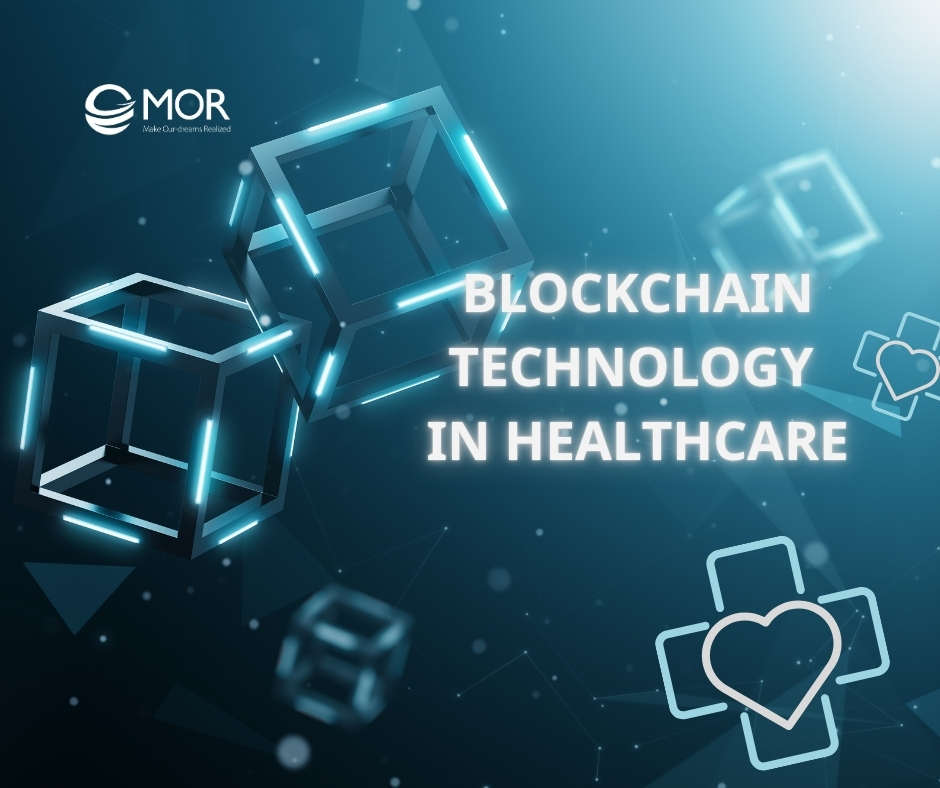
Healthcare runs on data, but most systems still can’t keep up. Sensitive records get lost, hacked, or siloed, while patients stay in the dark about who’s seen their information. Blockchain technology in healthcare promises a better way. Where trust, transparency, and security are built in from the start. This MOR Software’s guide breaks down how this technology is reshaping healthcare industry in 2026.
What Is Blockchain Technology in Healthcare?
Think of blockchain technology in healthcare as a digital logbook: shared, permanent, and tamper-proof. It’s a decentralized network where every entry gets locked in with a cryptographic signature. Once stored, no one can secretly alter or delete it. There’s no central control, and no single point of failure.
This matters in healthcare, where trust, privacy, and accuracy aren't negotiable. From fragmented systems to misplaced records, traditional setups struggle to manage sensitive data. That’s where blockchain changes the game.
With blockchain healthcare systems in place, providers, from hospitals to home care clinics can:
- Access real-time records across blockchain platforms
- Track patients with chronic conditions using wearables and IoT
- Save time by avoiding duplicated tests and paperwork
- Pinpoint patient histories and treatment patterns faster
- Stay current with verified research and trial results
- Identify at-risk groups and design targeted care
The application of blockchain technology in healthcare shifts control to the patient. It protects their identity, locks their history into a secure timeline, and keeps data accessible only to those with permission. This isn’t just innovation. It’s accountability built into the system.
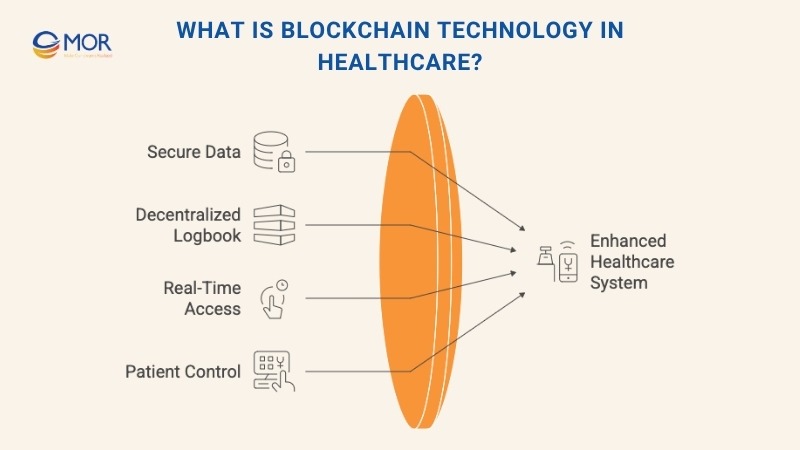
Stats and Facts of Blockchain Technology in Healthcare
The numbers tell the story. Blockchain technology in healthcare isn’t hype. It’s gaining real traction across the industry.
- The global blockchain healthcare market is on track to hit $193.43 billion by 2034, growing at a solid 35.08% CAGR from 2025 onward (Precedence Research).
- Experts also expect blockchain cloud solutions to touch a mind-bending $1,000 trillion by 2032 (Statista).
- Blockchain in supply chain, the market for blockchain-based systems could climb to $3.6 billion by 2031, with an annual growth rate of 34.5% (Business Research Insights).
- Pair blockchain with IoT? The market’s projected CAGR is 58.2% from 2023 to 2030, and North America already owns over 34% of the share (Grand View Research).
- Countries leading the charge in innovation include the U.S., Germany, the UK, Japan, China, and India (Mordor Intelligence).
The surge isn’t just about infrastructure. It reflects the industry’s real appetite for more secure, connected, and scalable systems. Whether it’s research, record sharing, or tracking drugs in real time, blockchain technology in healthcare is already shaping the next phase of digital health.
This growing demand lays the foundation for better blockchain use cases, especially where trust and transparency are non-negotiable.
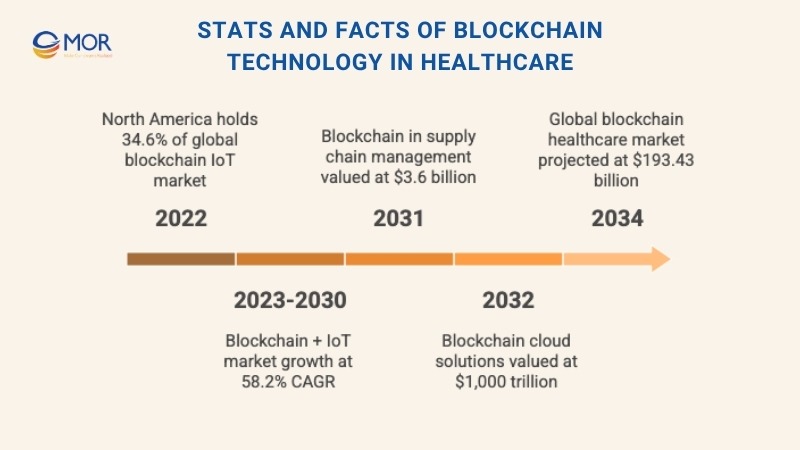
Benefits of Blockchain Technology in Healthcare
The real value of blockchain technology in healthcare isn’t just about decentralization. It’s about fixing what’s broken: fragmented systems, vulnerable data, and wasteful processes.
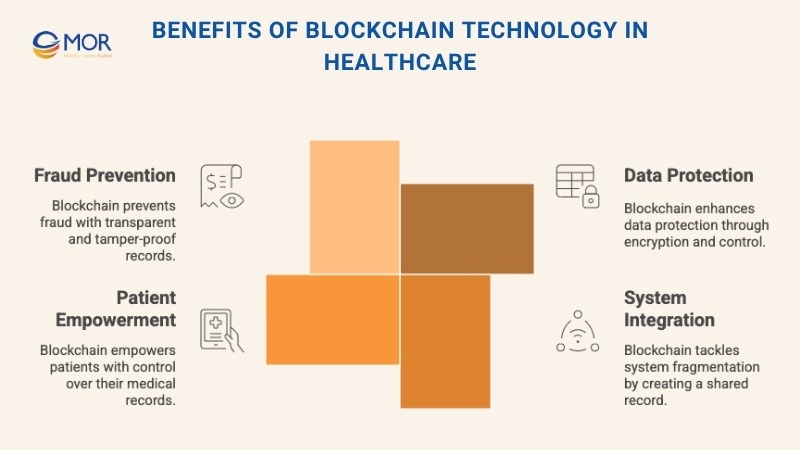
Stronger Data Protection for Patients
In 2023 alone, over 133 million U.S. medical records were exposed, according to HHS reports. That’s not just a number. It’s lives at risk. Blockchain locks down that risk with encrypted records, distributed control, and tamper-proof history.
Patients use private keys to manage access, adding a new layer of security and visibility that traditional systems just can’t match. It’s one of the biggest benefits blockchain brings to healthcare.
Tackling System Fragmentation
Most healthcare platforms still don’t talk to each other. Labs, clinics, insurers, all on different systems. Blockchain healthcare architecture creates a single source of truth. Everyone works off the same verified record, which cuts down on repeat tests, medical errors, and admin delays. It’s how real interoperability gets done.
Putting Patients in Control of Their Records
Smart contracts and decentralized IDs let patients manage their data like digital currency. They see who accessed their info, when, and why. No guessing, no waiting. This shift toward consent-based data sharing is a clear win for patient rights and a powerful application of blockchain technology in healthcare.
Transparent and Tamper-Proof Transactions
Fraud drains over $300 billion from global healthcare each year. Fake claims, incorrect billing, counterfeit drugs, you name it. Blockchain’s immutable ledger helps prevent all of it. Every record is trackable. Every change leaves a footprint. It’s fraud-resistant by design.
Core Applications of Blockchain Technology in Healthcare
Blockchain technology in healthcare is redefining how medical institutions handle data. It’s not just about encryption or decentralization. It’s about solving deeply embedded issues that have plagued the system for decades. From keeping records honest to speeding up clinical trials, these real-world applications show how blockchain moves healthcare forward.
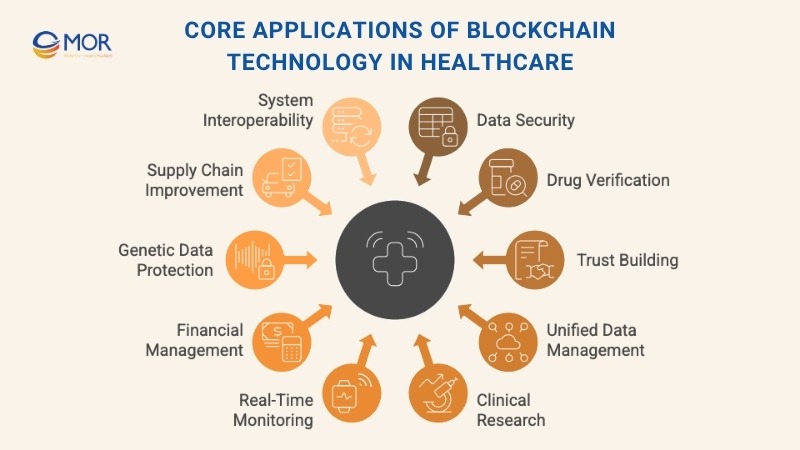
Securing Personal Medical Records
The application of blockchain in healthcare is changing how data is captured, stored, and managed across both research and care environments. With millions of entries created daily like bloodwork, diagnoses, treatment notes, wellness scores, the need for a better system is obvious.
Blockchain systems log patient data, including full EHRs, into encrypted, tamper-proof digital ledgers. Nothing can be overwritten, deleted, or faked.
By applying cryptographic signatures and hash values, practitioners can confirm that each record matches the original without exposing the content itself.
Cloud-based platforms built by blockchain medical records companies allow regulated, secure, and remote access to this information, complying with HIPAA and supporting the growing blockchain healthcare movement.
Tracking and Verifying Drug Information
When patients take medications, they expect them to be safe, effective, and traceable. Blockchain technology in healthcare provides transparency down to the source. Verified ledgers confirm drug origin, licensing status, and distribution path. Unlike traditional databases, blockchain makes that trail public and immutable.
This verification process supports high-stakes areas like pharma logistics and vaccine development. Blockchain-driven traceability helps prove authenticity, especially for imported or specialty drugs.
With innovation happening at the intersection of cloud, enterprise blockchain, and life sciences, the blockchain tech healthcare industry is poised to lead a more accountable future.
Building Trust Through Tamper-Proof Records
One of the strongest benefits blockchain delivers in healthcare is shared truth. Instead of reconciling conflicting records across departments, all parties work off the same verified ledger. That reduces redundant diagnostics, flags errors quickly, and makes provider handoffs smoother.
Hospitals, drug manufacturers, and insurance carriers benefit from this single source of truth. Counterfeit medications and billing scams drop dramatically when there’s full traceability and no data gaps. These blockchain solutions allow better outcomes and reduced costs at scale.
Unified Patient Data Management
Blockchain for healthcare solves the puzzle of scattered records. Instead of one file at a dentist, another at a clinic, and a third at a pharmacy, data is unified on-chain. Whether it’s a new prescription, updated insurance info, or a vaccination history, it stays synced.
Patients can share their information using blockchain healthcare apps that put them in control. These platforms remove the need for middlemen, prevent unauthorized changes, and give patients a better experience during check-ins and referrals.
Structuring Clinical Research Data
Blockchain technology in healthcare brings structure to the messy world of clinical trials. Trials are notorious for incomplete records, ethics issues, and unreliable results. With blockchain, every interaction: patient consent, dosage logs, protocol updates, gets recorded and time-stamped.
This builds trust for both regulators and the public. Smart contracts ensure participant permissions are respected, while results can be verified across stakeholders. Blockchain usecases like this create a cleaner data trail for life-saving research.
Detecting and Preventing Data Tampering
It’s easy to alter PDFs and databases, but hard to change a blockchain. This immutability makes it perfect for exposing falsified trial data or unapproved treatments. Once entered, records can’t be tampered with without the system knowing.
That’s why blockchain technology in healthcare is a natural fit for scientific accuracy. Publicly accessible audit trails confirm study protocols and enforce compliance. As more healthcare blockchain development companies roll out these tools, patient safety and research credibility both improve.
Enabling Real-Time Patient Monitoring
From hospital beds to home care, IoT-connected monitors are everywhere. But are they secure? Blockchain integrates with these devices, allowing encrypted, real-time data to be recorded and shared only with approved parties. Room conditions, vitals, and equipment usage are instantly logged.
By anchoring that data in blockchain, caregivers respond faster and more accurately. This is especially critical in high-risk cases like ICU tracking or pandemic management. It’s a high-trust model where every data point can be traced and verified.
Speeding Up Data Verification and Processing
Verifying insurance claims, licenses, or identity usually involves back-and-forth emails and manual checks. Blockchain cuts that down drastically. Once a credential or data point is stored on-chain, it’s always available for instant cross-reference.
This blockchain technology in healthcare application creates efficiency gains for hospitals, insurers, and government programs. It also lowers costs by reducing duplicate work, paperwork, and administrative review cycles.
Simplifying Hospital Financial Management
Accounting departments in hospitals face tight regulations and razor-thin margins. Blockchain streamlines reporting by tracking every transaction and expense in real time. That includes trial budgets, grant disbursements, billing history, and even refunds.
Patients also benefit. Blockchain apps can handle up-front paperwork like smart contract insurance claims or pre-visit billing so that care isn’t delayed by logistics. As financial transparency becomes a bigger issue, blockchain gives CFOs the audit trail they need.
Protecting Genetic Data and Privacy
Genomic data is some of the most sensitive and valuable health info around. It needs ironclad protection. Blockchain for healthcare offers privacy-by-design models that encrypt and store DNA data for secure access.
Rather than uploading sequences to risky servers, patients and researchers can exchange data through blockchain-secured platforms. Startups are using smart contracts to manage usage rights, creating safe marketplaces for innovation without exposure.
Improving Pharmaceutical Supply Chains
From factory to pharmacy, blockchain helps trace every step of a drug’s journey. Manufacturers log production info. Distributors confirm handling. Pharmacies validate receipts.
Each block builds trust. This transparency cuts out fake medications and speeds up delivery. Combined with IoT, blockchain provides the kind of real-time visibility that’s becoming essential in modern pharmaceutical supply chains.
Making Systems Interoperable by Default
No more silos. Blockchain healthcare applications are enabling systems to talk to each other, regardless of platform or vendor. That means fewer lost records, less double-entry, and faster care.
Clinics, hospitals, labs, and payers can tap into a shared blockchain network, pulling accurate, up-to-date data instantly. This is one of the clearest advantages of blockchain technology in healthcare, eliminating barriers that slow things down.
Common Challenges When Implementing Blockchain Technology in Healthcare
While blockchain technology in healthcare opens new doors for data security and operational efficiency, the road to implementation isn’t without friction. Healthcare organizations face real-world hurdles like technical, legal, and cultural that slow adoption.
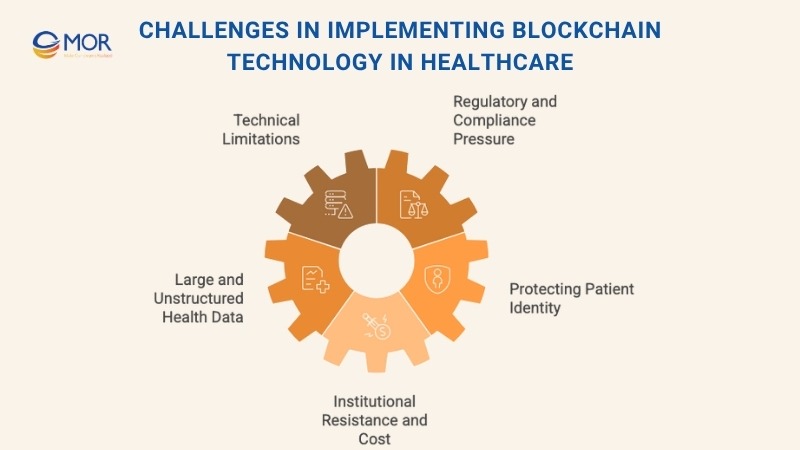
Technical Limitations
One of the most talked-about issues in the blockchain healthcare space is tech compatibility. Legacy systems at hospitals weren’t built for distributed ledgers. Syncing these older infrastructures with blockchain creates bottlenecks in speed and scalability. Errors become permanent in a decentralized ledger, with no easy fix.
Plus, building and maintaining blockchain platforms comes with high development and operational costs, which can push smaller healthcare providers out of the picture.
Regulatory and Compliance Pressure
In the U.S., HIPAA governs the use and protection of patient data. Any blockchain technology in healthcare rollout must meet strict federal standards, especially when it comes to storing and sharing Protected Health Information (PHI).
Even if the tech itself is secure, firms can’t risk missteps around compliance. Legal and IT teams need to work in lockstep before deploying any live system.
Large and Unstructured Health Data
Hospitals deal with massive amounts of data: medical imaging, lab results, wearable device feeds, handwritten notes. Blockchain wasn’t built to store bulky files. That’s where healthcare runs into a key roadblock. The question isn’t just about volume, but whether blockchain can handle irregular formats and fast-changing data efficiently..
Protecting Patient Identity
While cryptography strengthens privacy, managing patient identities on-chain introduces new risks. If private keys are lost or exposed, patient control disappears. Maintaining security without compromising usability is a delicate balance. Patients may gain access rights, but systems need guardrails to prevent unauthorized disclosure or misuse.
Institutional Resistance and Cost
Blockchain introduces a new model, one where no central authority owns the data. That sounds great in theory but can feel threatening to healthcare organizations used to controlling their databases.
Internal resistance is common, especially when staff lack blockchain experience. Training, workflow changes, and governance issues can all delay progress.
Future of Blockchain Technology in Healthcare
The growth of blockchain technology in healthcare is no longer speculative. It’s happening. From market size to tech integration, the signals are clear: this is where the industry is headed.
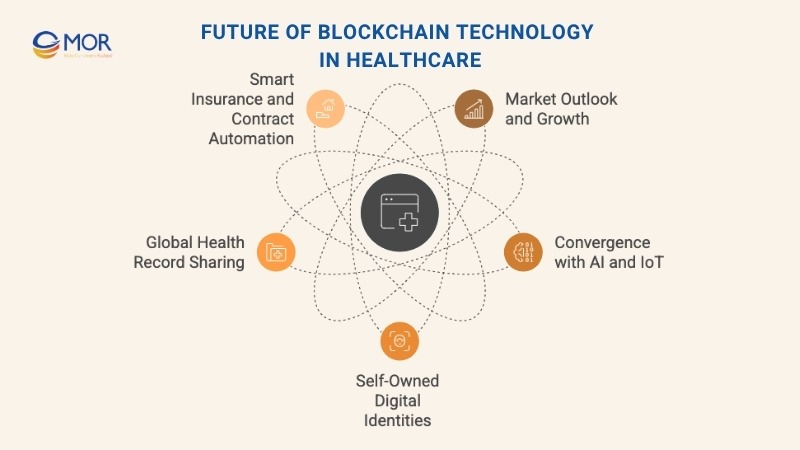
Where the Market Is Headed
According to recent projections, the global healthcare blockchain market will jump from $2.89 billion in 2023 to $14.25 billion by 2030.
That’s a staggering CAGR of 39.1%. North America currently leads adoption, but Europe and Asia-Pacific are closing in fast, thanks to strong investments in EHR platforms, identity verification systems, and health data exchanges.
This expanding market reflects real-world traction, not just innovation buzz. Health providers and tech companies alike are aligning around blockchain technology in healthcare as a sustainable, long-term solution.
Merging with AI and Connected Devices
The future isn’t blockchain alone. It’s blockchain plus AI and IoT. Imagine multimodal AI models diagnosing patients or predicting conditions, while blockchain secures the source of the data, logs access, and prevents tampering.
In clinical environments, IoT devices log vitals and treatments automatically. Blockchain makes those logs unalterable and traceable, which is vital for FDA and HIPAA compliance.
This trio, AI, IoT, and blockchain, makes smart care possible: real-time analytics, remote monitoring, and adaptive treatments that respond instantly. That’s how the blockchain tech healthcare industry goes from digital to intelligent.
Growth of Self-Owned Digital Identities (DID)
Decentralized Identifiers (DIDs) and Self-Sovereign Identity (SSI) frameworks are reshaping how patients manage their data. Instead of relying on hospitals or apps, patients store their identity and health data on-chain. They choose who sees it and when whether it’s for trial enrollment, travel vaccinations, or cross-border treatment approvals.
This shift fits perfectly with the direction of blockchain technology applications in healthcare an overview, where control belongs to the individual, not the institution.
Global Health Record Sharing
Cross-border care is a mess. Records don’t follow patients, and verifying identity or treatment history across systems can take days. Blockchain healthcare solutions promise to unify data across hospitals, countries, and care providers.
In Europe, the eHealth Digital Service Infrastructure is already exploring how blockchain can solve that. In the U.S., ONC-backed pilots are testing it for Medicare and Medicaid interoperability. With smart contracts and decentralized apps, patients can carry verified records wherever they go from refugee camps to vacation hospitals.
Smarter Insurance and Contract Automation
The insurance approval cycle is a maze of claims, forms, and waiting. Smart contracts are set to change that. They check patient eligibility, validate services, and trigger payments automatically when milestones are met. No human intervention needed.
Clinical trials benefit, too. Smart contracts release funding as participants enroll, submit data, or reach protocol goals. It’s transparent, secure, and efficient, everything healthcare finance currently isn’t.
All signs point to one conclusion: the future of blockchain technology in healthcare is about real outcomes, not just better storage. From digital IDs to automated billing, the system is getting smarter, more transparent, and more patient-driven.
Conclusion
The promise of blockchain technology in healthcare isn’t in the future. It’s already unfolding. From encrypted health records to transparent drug supply chains, the tools are here, and the impact is real. Yes, challenges remain, but the demand for secure, patient-first systems is only growing.
Hospitals, insurers, and innovators now face a choice: stick with fragile legacy systems or move toward a model built on trust, accuracy, and accountability. This guide was built to help you make that shift. Ready to explore what’s possible? Contact us to build your next healthcare blockchain solution.
MOR SOFTWARE
Frequently Asked Questions (FAQs)
1. What is blockchain technology in healthcare?
Blockchain technology in healthcare refers to the use of decentralized digital ledgers to securely store, share, and validate health data. Instead of relying on a single system or administrator, it allows hospitals, labs, insurers, and patients to access verified records like EHRs, prescriptions, and test results without intermediaries or data tampering.
2. What are the benefits of blockchain technology in healthcare?
The benefits blockchain brings include better data privacy, reduced fraud, improved transparency, and faster access to health records. It helps fix interoperability issues and gives patients more control over their information. Medical staff can also access accurate, real-time data without duplication or delay.
3. How does blockchain improve security and privacy in healthcare?
With private key access, end-to-end encryption, and immutable logging, blockchain healthcare systems offer stronger protection than traditional databases. Patients can allow or restrict access to their records at any time, making their personal data less vulnerable to breaches or misuse.
4. What are some real-world blockchain usecases in healthcare?
Examples include secure electronic health records, automated claims processing with smart contracts, verifying clinical trial data, and real-time patient tracking. These blockchain usecases solve day-to-day problems in care coordination, research integrity, and billing efficiency.
5. How is blockchain used in pharmaceutical supply chains?
Blockchain technology in healthcare tracks each medication batch from factory to pharmacy, preventing counterfeits. It logs manufacturing, handling, and shipping details, making it easier to confirm authenticity, expiration dates, and delivery status.
6. What does the future look like for healthcare blockchain?
Expect tighter integration between blockchain, AI, and IoT. New use cases include decentralized IDs for patients, smarter health insurance, and global health record sharing. This aligns with broader trends in blockchain technology in healthcare a systematic review of patient-first, data-secure solutions.
7. What are the challenges of implementing blockchain in healthcare?
Key obstacles include legacy system integration, regulatory compliance (like HIPAA), high upfront costs, and the need for technical expertise. These are common topics in blockchain technology in healthcare challenges and opportunities discussions among hospital IT leaders.
8. Why is blockchain getting more attention in healthcare now?
Rising data breaches, increasing demand for patient-centered care, and pressure to improve efficiency are all driving interest. Blockchain technology in healthcare offers a trusted, flexible backbone for rebuilding digital health systems, faster, fairer, and more secure than ever.
Rate this article
0
over 5.0 based on 0 reviews
Your rating on this news:
Name
*Email
*Write your comment
*Send your comment
1